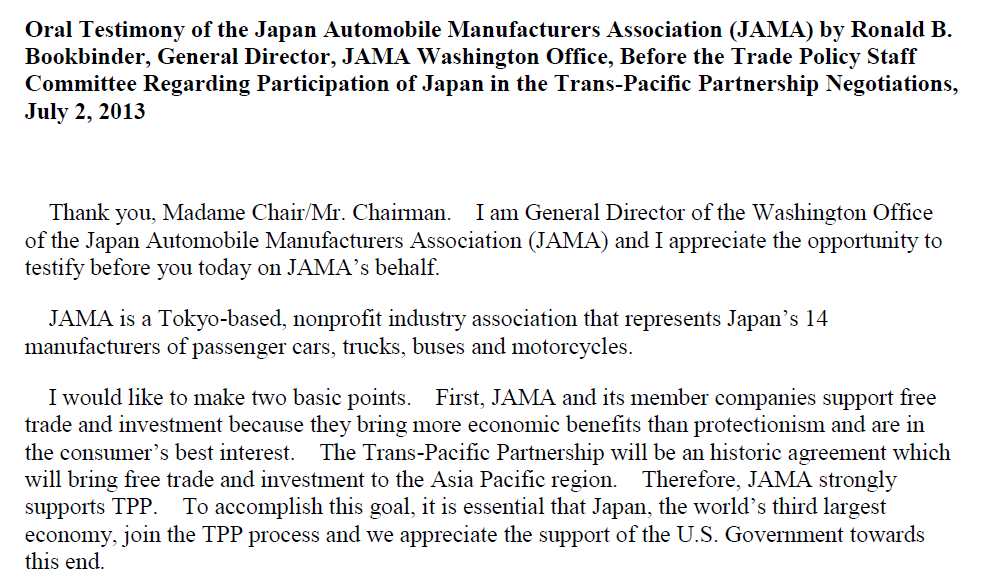Oral Testimony of the Japan Automobile Manufacturers Association (JAMA) by Ronald B. Bookbinder, General Director, JAMA Washington Office, Before the Trade Policy Staff Committee Regarding Participation of Japan in the Trans-Pacific Partnership Negotiations, July 2, 2013
Thank you, Mr. Chairman. I am Ron Bookbinder, General Director of the Washington Office of the Japan Automobile Manufacturers Association (JAMA) and I appreciate the opportunity to testify before you today on JAMA’s behalf.
JAMA is a Tokyo-based, nonprofit industry association that represents Japan’s 14 manufacturers of passenger cars, trucks, buses and motorcycles.
I would like to make two basic points. First, JAMA and its member companies support free trade and investment because they bring more economic benefits than does protectionism and are in the consumer’s best interest. The Trans-Pacific Partnership will be an historic agreement which will bring free trade and investment to the Asia Pacific region. Therefore, JAMA strongly supports TPP. To accomplish this goal, it is essential that Japan, the world’s third largest economy, join the TPP process and we appreciate the support of the U.S. Government towards this end.
Second, as part of JAMA’s commitment to promoting trade liberalization, we emphasize our historic willingness and support in addressing any specific, Japanese auto market-related concerns that are identified and continue to seek ways to cooperate with our global counterparts towards expanding trade and opportunities in all countries.
By Promoting Free Trade and Investment, Japan’s Participation in the TPP Will Benefit the U.S. Economy
Japanese auto companies have been at the forefront of the internationalization of the auto industry. Subscribing to the concept that vehicles should be built in the markets where significant demand exists, we have shown that when auto production is able to freely cross borders, economies grow, standards of living rise, and jobs multiply.
As a result of our $35.4 billion investment in U.S. manufacturing plants since the early 1980s, we now directly employ 81,000 Americans in vehicle manufacturing, R&D and distribution. The independent dealers who sell our vehicles employ 327,000 Americans. A recent JAMA-sponsored economic analysis by Rutgers University Professor Thomas Prusa calculated that, including direct, intermediate and spin-off employment, our members’ U.S. production facilities and their U.S. dealer networks combined generate an estimated 1.2 million American jobs.
TPP will integrate markets in the Asia Pacific region, thus encouraging Japanese automakers to expand their investment and business in the U.S.
Japan’s Participation in the TPP Will Benefit U.S.-Japan Auto Trade
JAMA welcomes the stated objective of TPP to obtain a “high standards” agreement that is comprehensive, that addresses both tariffs and non-tariff barriers, and that promotes market access and mutual market opening initiatives. For that reason, JAMA considers any protracted process of automotive tariff elimination to be regrettable.
JAMA also believes that Japan’s participation in the TPP will contribute to the development of rules that promote free trade, open investment and the protection of intellectual property rights, among other things.
The Japanese Auto Market Is Fully Open
JAMA observes that at times during the Japan TPP debate in the U.S., misunderstandings have led to statements that Japan’s market is closed to imports. In fact, Japan has zero auto tariffs and no restrictive customs or regulations only apply to imported vehicles. With regard to dealerships, there is no restriction on the brands or vehicles dealers in Japan can sell and Japanese automakers cannot intervene in these dealer decisions.
In the case of the Japanese market, it is essential to note that Japanese consumers overwhelmingly prefer very small cars, which U.S.-based automakers rarely provide. In 2012, smaller passenger cars, those with up to 2,000cc in engine capacity, had a 90 percent market share in Japan. However, the U.S.-based automakers offered only five models in this segment while European automakers offered 87 models. Accordingly, European car sales and market shares have been rising. These realities confirm that a critical factor to success in any auto market is to offer sufficient choices of models that appeal to local consumers.
Finally, JAMA reiterates our historic willingness and support in addressing any specific, Japanese auto market-related concerns that are identified. Since the first interaction between our two countries on auto trade in the 1980s, through the MOSS and Framework negotiations, JAMA has sought to be a positive force by organizing, or helping to organize, business seminars, including one-on-one meetings between the Japanese auto companies and U.S. auto parts companies, and by engaging in continuous, constructive dialogue at the industry trade association level. We look forward to continuing this positive role.
I want to thank the Committee for this opportunity to testify and reiterate JAMA’s strong support for a successful TPP including Japan.
Click to view PDF


